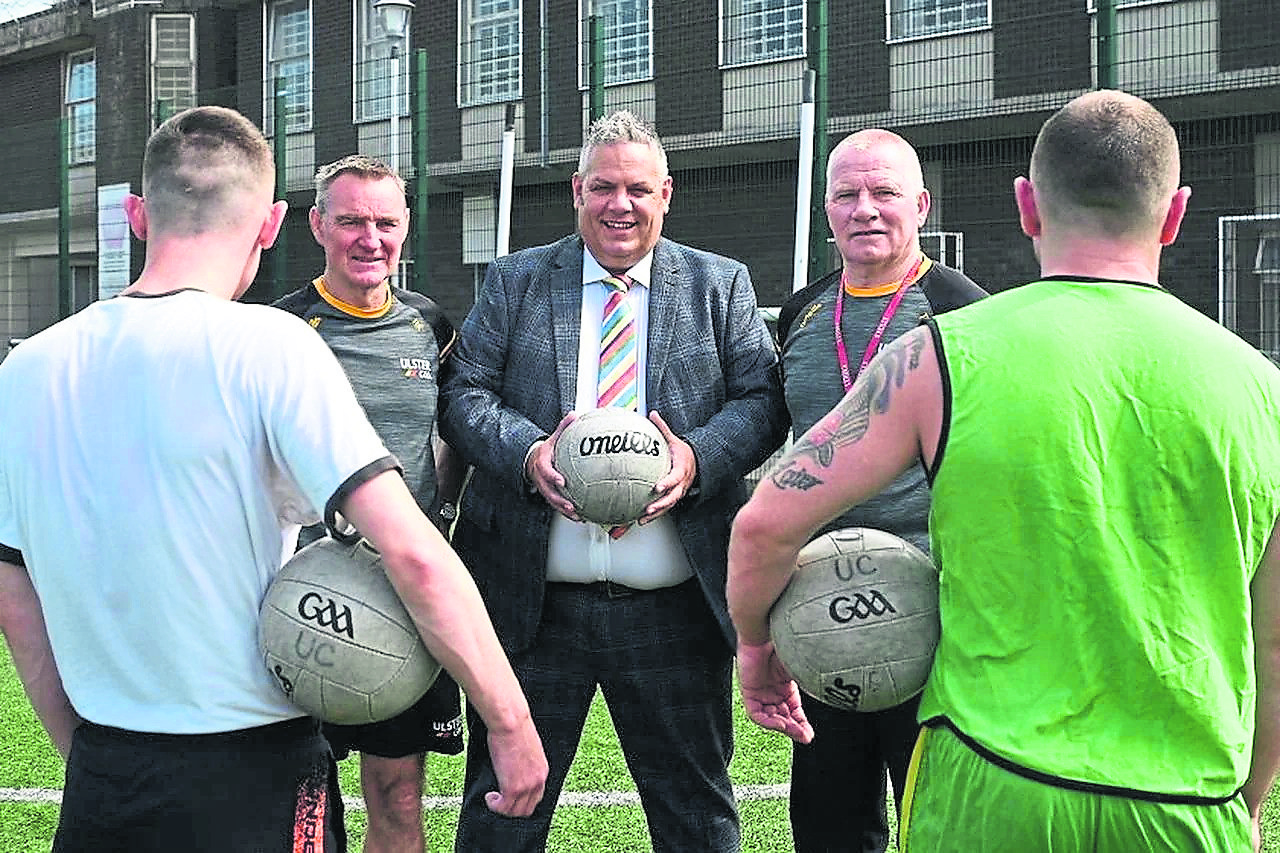Ulster GAA coach Roger Keenan gives an insight into their coaching drive at local prisons
By Niall Gartland
A CHANGE of scenery. The average Joe never so much as sets foot inside a prison, and well, you could say that’s a good thing.
Roger Keenan and a few of his coaching buds from Ulster GAA have become rather acquainted with all these places we’ve heard about over the years – Maghaberry, Magilligan, Hydebank.
As institutions, they have their issues. Chief Inspector of Prisons in England and Wales Nick Hardwick said back in 2015, “This (Maghaberry) is one of the worst prisons I’ve ever seen and the most dangerous prison I’ve been to.”
To that, he added with a rhetorical flair: “It feels a bit like going back in time, Dickens could write about Maghaberry without batting an eyelid.”
Improvements have been made in the intervening decade, and bi-annual six-week coaching courses is part of that modernising drive. It’s about rehabilitation, fostering relationships between the prisoners, meaningful exercise and learning new skills.
And according to Gortin native Roger Keenan, it’s a hugely gratifying experience for the coaches as well. Maghaberry is his stomping ground, where he oversees sessions with Derry legend Tony Scullion.
One course is run with what he calls the “ordinary prisoners” and the other is conducted with the the segregated prisoners in Roe House – i.e. republican prisoners. Some are GAA men, and some are not, as Keenan explains.
“We usually get a group of about 14. Out of that, there are always six or seven who’ve played a bit of GAA in the past – lads from Ardoyne Kickhams, Killeavy, or anywhere really. Then there’s another group who never experienced GAA before, some from the other side of the community, some from East Belfast, some from abroad.
“We actually really enjoy it. There’s a real feel-good factor, believe it or not. Tony and I get on well. We’ve coached together for a long time, so we have a great rapport with the lads.
“We’re totally non-judgmental and just treat them as people. We build up relationships, and when we finish a six-week programme there are nearly tears that we’re leaving.”
The whole initiative is part of a sports rehabilitation drive. One school of thought is that the prison system is fundamentally ineffective at punishment and rehabilitation, with high re-offending rates, but Keenan says the coaching course is beneficial in a number of respects.
“The big thing is that we’re in at the request of the prisoners. It’s not something imposed on them — it’s the highlight of their week. Some of those people are locked up maybe 22 hours a day. The whole thing is about rehabilitation and developing their skills, not just football but personal skills as well.
“One of the goals is to equip the prisoners with coaching skills, but also to foster rehabilitation through sport.
“I’ve seen the benefits from their perspective. Whether it does everything we’d like, I’m not sure, but it certainly builds relationships and gives them the chance to get outside and do a bit of physical activity, which obviously helps their mental health.
“The more activities they attend in there, the better – it can even help reduce their lock-in time, so they’re earning brownie points by being there as well. And honestly, it’s great craic.”
Facilities are very much fit-for-purpose. They’re nothing glamorous but they do the job.
Keenan said: “Before we came in, rugby and soccer had already been in. Maybe someone asked why GAA wasn’t. So now we’re giving them the chance to learn the skills. Tony has even introduced handball in Magilligan, and I’d assume we’ll do something similar in Maghaberry.
“Facilities-wise, we normally use Maghaberry’s 3G pitch. It’s not massive — about 70 by 30 or 40 — but it’s a good enough size for 6v6 games and for skills work, so it’s ideal. It’s outdoors, obviously, but they also have an indoor gym we can use if needed. I’ve only had to use it once, when it was really wet. Facilities are fine. Maybe Magilligan could be better, but honestly I’ve been lucky with the weather over six years.”
Keenan has fostered positive relationships with the prisoners over the years. A non-judgemental approach has been key, and it helps that the comradeliness goes both ways.
“We often see the same prisoners back out again — long-term men. We get to know them well. There are a few we’ll always recognise. There are high fives all around when we arrive and when we leave, so the relationship is really good.
“Of course, everyone has preconceptions — that’s human nature. But to me, and I have to say Tony is very good at this, we just treat everybody as we find them. We don’t be thinking, “Why are they here?” or “What have they done?” We’re there for six weeks to give them the best possible experience.”
He continued: “We chat with them regularly, especially the ones who’ve played GAA before. The GAA is such a tight-knit network that we always have craic with them about that.
“They’re very open, and sometimes they’ll tell us why they’re in. But we don’t delve into that or make assumptions. With the long-term lads, we’ve built up real relationships. I’d say we’re very well received, and it’s the highlight of their week when we come in.”
Receive quality journalism wherever you are, on any device. Keep up to date from the comfort of your own home with a digital subscription.
Any time | Any place | Anywhere















